 The Office of the Provost and Senior Vice President for Academic Affairs has announced that Dr. Timothy Schulz (DataS), professor of Electrical and Computer Engineering, has been named a 2019 University Professor.
The Office of the Provost and Senior Vice President for Academic Affairs has announced that Dr. Timothy Schulz (DataS), professor of Electrical and Computer Engineering, has been named a 2019 University Professor.
The University Professor title recognizes faculty members who have made outstanding scholarly contributions to the University and their discipline over a substantial period of time. University Professors will not exceed 2% of the total number of tenured and tenure-track faculty at Michigan Tech. This year, two professors were awarded the title of University Professor. The second recipient is Dr. Kathleen Halvorsen, professor of Natural Resource Policy in the Department of Social Sciences.
The confidential process for selecting recipients spans the academic year and recipients for each award are notified in mid-May. Additional details regarding the award and selection procedures can be found on the provost’s website: mtu.edu/provost/faculty/awards.
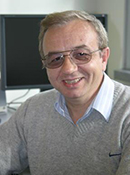 Dr. Soner Onder (CS, SAS) will present an invited talk titled “Program semantics meets architecture: What if we did not have branches?” at a workshop organized in honor of the 80th birthday of Prof. Yale Patt of University of Texas, Austin. Prof. Patt is a prominent researcher with decades of accomplishments in Computer Architecture.
Dr. Soner Onder (CS, SAS) will present an invited talk titled “Program semantics meets architecture: What if we did not have branches?” at a workshop organized in honor of the 80th birthday of Prof. Yale Patt of University of Texas, Austin. Prof. Patt is a prominent researcher with decades of accomplishments in Computer Architecture.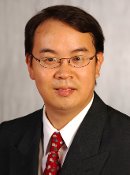 Yu Cai (TTEC/ICC) is Principal Investigator on a project that has received a $82,416 Other Sponsored Activities Grant from the National Security Agency/National Science Foundation. The one-year project is titled, “Innovation GenCyber Learning Experience for High School Students Through Storytelling + Teaching + Gaming + Doing.” Bo Chen (SCS), Guy Hembroff (TTEC), and Tim Van Wagner (TTEC), are co-PIs.
Yu Cai (TTEC/ICC) is Principal Investigator on a project that has received a $82,416 Other Sponsored Activities Grant from the National Security Agency/National Science Foundation. The one-year project is titled, “Innovation GenCyber Learning Experience for High School Students Through Storytelling + Teaching + Gaming + Doing.” Bo Chen (SCS), Guy Hembroff (TTEC), and Tim Van Wagner (TTEC), are co-PIs.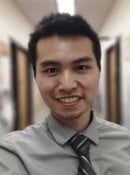 Zhen Liu (CEE/MTTI) is Principal Investigator on a project that has received a $90,418 contract with Michigan Department of Transportation. This project is titled “Improved Calculation of Scour Potential in Cohesive Soils and Scour Susceptible Rock.” Brian Barkdoll (CEE) and Stan Vitton (CEE) are co-PI’s on this 14-month project.
Zhen Liu (CEE/MTTI) is Principal Investigator on a project that has received a $90,418 contract with Michigan Department of Transportation. This project is titled “Improved Calculation of Scour Potential in Cohesive Soils and Scour Susceptible Rock.” Brian Barkdoll (CEE) and Stan Vitton (CEE) are co-PI’s on this 14-month project.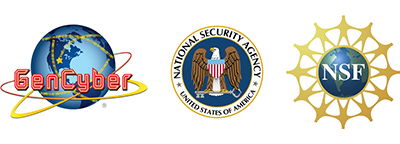 Michigan Tech will offer two non-residential, week-long GenCyber camps this summer. The first camp is for local middle school and high school students (grades 7-12) and will be held the week of June 17. The second camp is for local K-12 STEM teachers and will be held the week of August 12.
Michigan Tech will offer two non-residential, week-long GenCyber camps this summer. The first camp is for local middle school and high school students (grades 7-12) and will be held the week of June 17. The second camp is for local K-12 STEM teachers and will be held the week of August 12.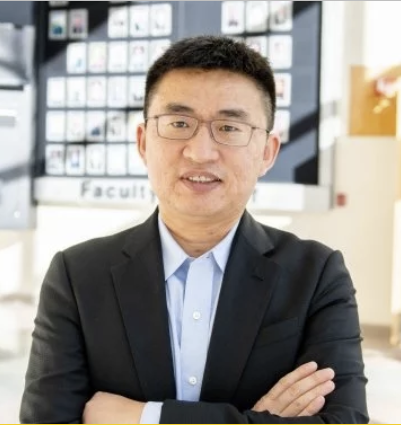 Kuilin Zhang’s (CPS/CEE) research on transportation planners was the subject of a story covered in Auto World News titled, “Filling in the gaps of connected car data helps transportation planners,” which was published on May 6, 2019.
Kuilin Zhang’s (CPS/CEE) research on transportation planners was the subject of a story covered in Auto World News titled, “Filling in the gaps of connected car data helps transportation planners,” which was published on May 6, 2019.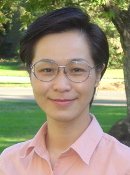 Graduate students Chong Cao and Joe Oncken work with researcher Bo Chen (CPS/ME-EM) in the Intelligent Mechatronics and Embedded Systems lab. In the lab, they develop Simulink models for smart city technology — and show how the models shift into real-life testing.
Graduate students Chong Cao and Joe Oncken work with researcher Bo Chen (CPS/ME-EM) in the Intelligent Mechatronics and Embedded Systems lab. In the lab, they develop Simulink models for smart city technology — and show how the models shift into real-life testing.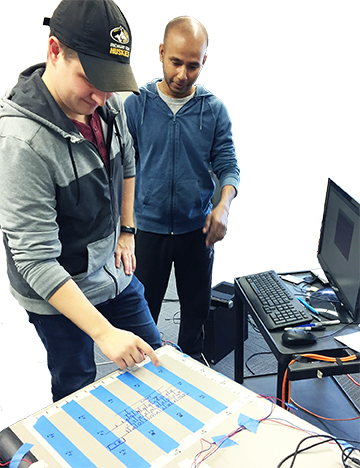 By Karen Johnson, ICC Communications Director
By Karen Johnson, ICC Communications Director